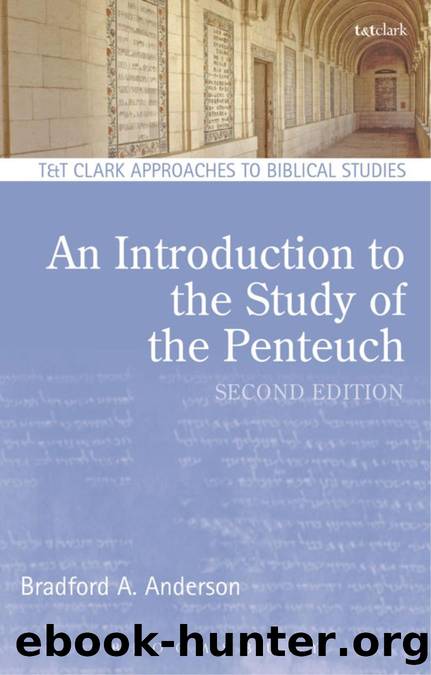An Introduction to the Study of the Pentateuch by Bradford A. Anderson

Author:Bradford A. Anderson
Language: eng
Format: epub
Publisher: Bloomsbury
Published: 2019-11-21T16:00:00+00:00
11
Moses and the Exodus Tradition (Exodus 1–15)
The book of Exodus begins where Genesis ends: in Egypt. In this sense, it acts as a sequel to the events described in the Joseph narrative. Exodus 1.8 in particular (‘now a new king arose over Egypt, who did not know Joseph’) seems to indicate that we are to understand what follows as the next episode in the story. Almost as soon as it begins, however, it becomes clear that the nature of the account has changed. The story no longer describes a family history, with a single significant ‘patriarch’ as leader. Joseph’s descendants are now ‘numerous’ and ‘powerful’ (Exod. 1.9). The altered nature of the people also leads to a different kind of leader. Moses is chosen by God to lead the people, not by virtue of rank or birthright, but by virtue of divine calling. Although Exodus clearly follows on from the Genesis narrative, the situation is very different. As Genesis 12–50 moved the story of beginnings on from a universal history to the history of a chosen family, so Exodus also moves the story on from a family history towards the history of a people.
The book of Exodus falls easily into four sections (for an introduction to and overview of the book of Exodus, consult Chapter 3). Exodus 1.1–12.36 describes the situation of the people in Egypt and the rise of Moses; Exod. 12.37–15.21 recounts the exodus from Egypt; Exod. 15.22–18.27 describes the wandering in the wilderness; and Exod. 19.1–40.30 narrates the giving of the law to Moses on Sinai. The first two sections are the focus of this current chapter, which highlights a number of critical issues related to Moses and the account of the liberation of the Israelites in the exodus event. The latter two sections of Exodus present the themes of wilderness wanderings and law, themes which are also found in the remaining books of the Pentateuch (Leviticus, Numbers, and Deuteronomy). For this reason, Exod. 15.22–40.30 will be explored in more detail in Chapters 12 and 13. In what follows we explore literary and thematic elements, historical issues and concerns, as well as religious and theological implications of these first chapters of Exodus.
Literary and thematic elements of Exodus 1–15
Origins and relationship to Pentateuch traditions
In the traditional Documentary Hypothesis, the narrative of the exodus traditions found in Exodus 1–15 was considered to come from a combination of Yahwistic, Elohistic, and Priestly sources. However, as outlined in Chapter 7, developments in pentateuchal studies over the past several decades have had a significant impact on research into the origins of the exodus tradition, as well as its relationship to the broader pentateuchal materials. Most notably, questions surrounding the feasibility of the ‘E’ source, as well as the possibility of a coherent ‘J’ source that spans Genesis-Numbers, have led to a reappraisal of these issues. Further, recent research has suggested that the Moses story was originally an independent account of the origins of Israel, distinct from the ancestral narratives of Genesis. In
Download
This site does not store any files on its server. We only index and link to content provided by other sites. Please contact the content providers to delete copyright contents if any and email us, we'll remove relevant links or contents immediately.
| Hebrew Bible (Old Testament) | Talmud |
| Torah | Zohar |
The Power of Habit by Charles Duhigg(3139)
Man's Search for Meaning by Viktor E. Frankl(2671)
Mckeown, Greg - Essentialism: The Disciplined Pursuit of Less by Mckeown Greg(2441)
MOSES THE EGYPTIAN by Jan Assmann(2417)
Devil, The by Almond Philip C(2331)
The Complete Dead Sea Scrolls in English (7th Edition) (Penguin Classics) by Geza Vermes(2283)
Unbound by Arlene Stein(2275)
I Capture the Castle by Dodie Smith(2038)
Schindler's Ark by Thomas Keneally(1885)
The Invisible Wall by Harry Bernstein(1805)
The Gnostic Gospel of St. Thomas by Tau Malachi(1798)
The Bible Doesn't Say That by Dr. Joel M. Hoffman(1680)
The Secret Doctrine of the Kabbalah by Leonora Leet(1610)
Political Theology by Carl Schmitt(1586)
The Jewish State by Theodor Herzl(1534)
A History of the Jews by Max I. Dimont(1531)
The Dead Sea Scrolls Bible by Martin G. Abegg(1517)
The Book of Separation by Tova Mirvis(1488)
Oy!: The Ultimate Book of Jewish Jokes by David Minkoff(1372)
